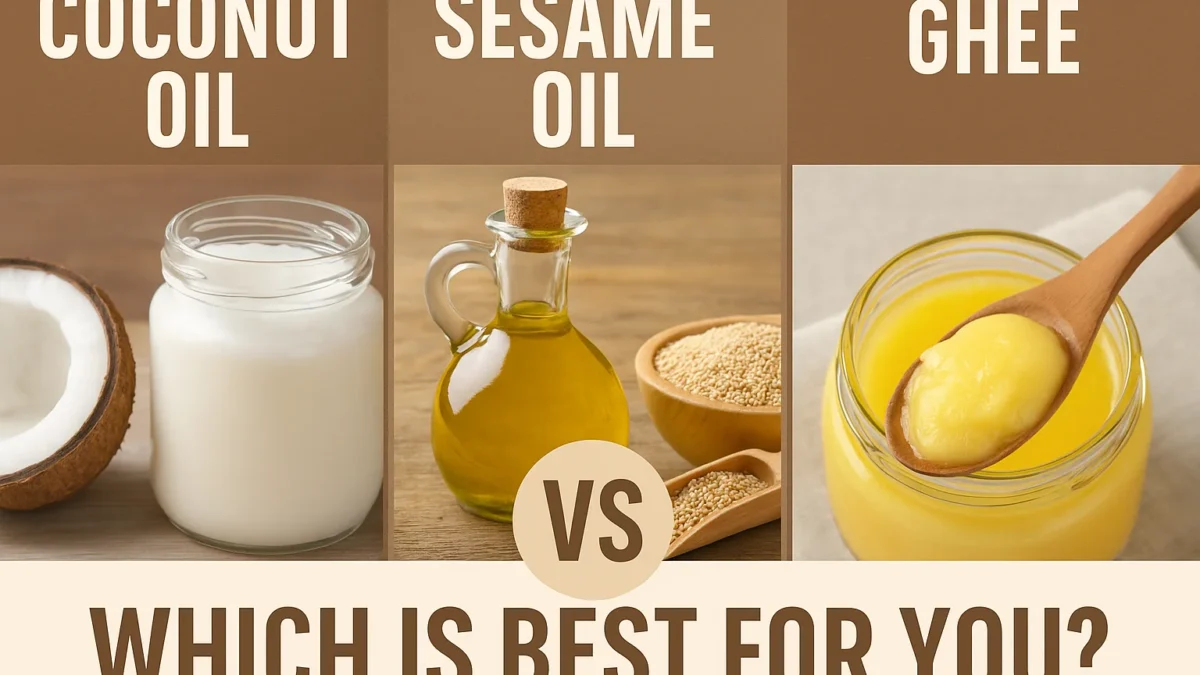Table of Contents
- Introduction
- Why Compare: Coconut Oil vs Sesame Oil vs Ghee
- Ancient Origins & Cultural Use
- Nutritional Profile, Smoke Points & Oxidative Stability
- Evidence-Backed Health Benefits
- Best Uses in Cooking & Digestion
- Which Is Best for Specific Conditions?
- How to Rotate: A Weekly Balanced Plan
- Label Decoding & Quality Checks
- Allergy, Lactose & Dietary Considerations
- Storage, Shelf Life & Cost per Serving
- Common Mistakes & Quick Fixes
- Myths vs Facts: Coconut Oil vs Sesame Oil vs Ghee
- FAQs: Coconut Oil vs Sesame Oil vs Ghee
- Conclusion
- References
Introduction
Coconut Oil vs Sesame Oil vs Ghee isn’t a fight; it’s a framework. When you know exactly where each fat shines—in heat tolerance, flavor, digestion, and wellness—you can design meals that taste amazing and support health goals. This guide blends ancestral wisdom and modern evidence so you can choose confidently every day.
தமிழில்: “எண்ணெய் சேர்த்த சமையல்—சரியான அளவும் சரியான வகையும் முக்கியம். உடலுக்கு ஒத்துப் போனதே நல்லது.”
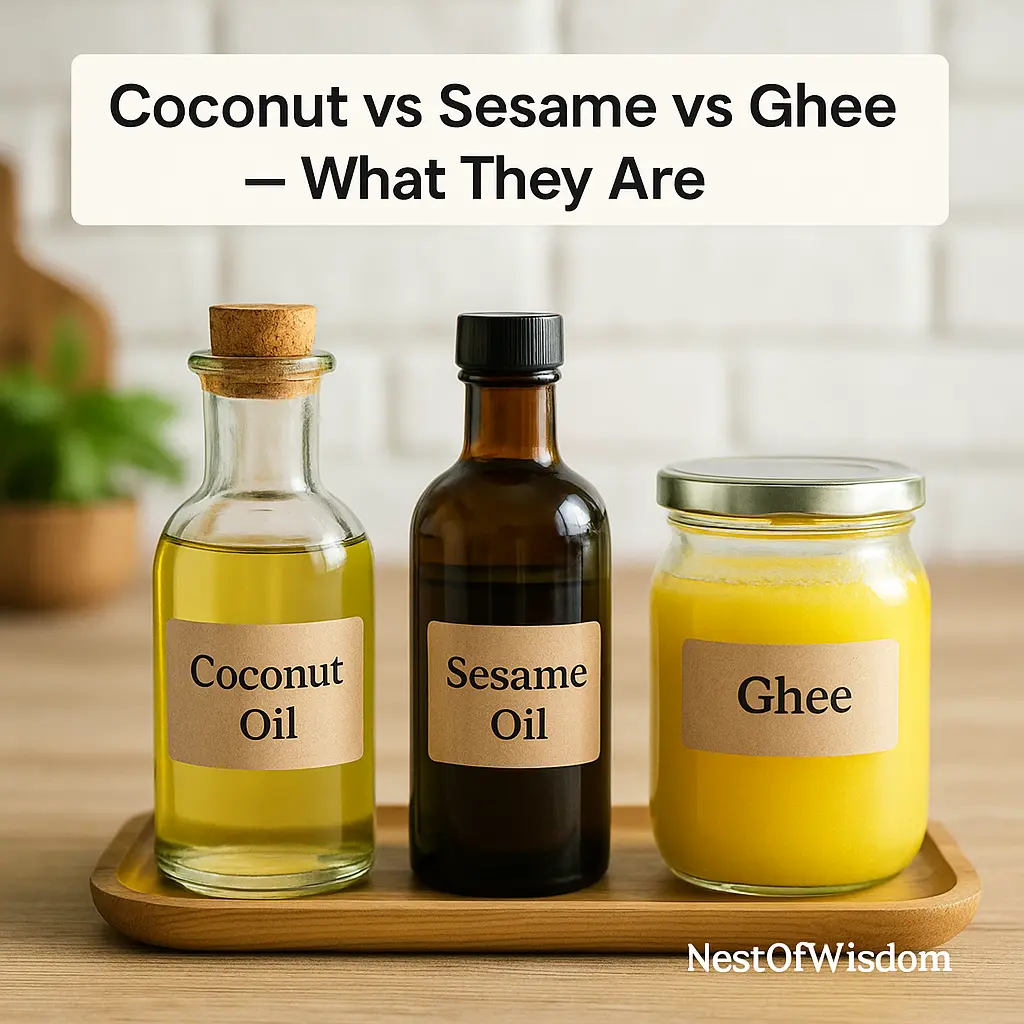

Why Compare: Coconut Oil vs Sesame Oil vs Ghee
Placing Coconut Oil vs Sesame Oil vs Ghee side-by-side clarifies which fat to use for which job. Coconut oil offers pleasant aroma and medium heat stability, sesame oil brings antioxidants and a heart-smart unsaturated profile for moderate heat, and ghee delivers the best high-heat performance with butyrate and fat-soluble vitamins. Matching your oil to the dish and goal prevents overheating, preserves nutrients, and keeps digestion calm.
Ancient Origins & Cultural Use
- Coconut Oil: Beloved in coastal Tamil kitchens for chutney tempering, poriyal, light sauté, oil pulling (kavala), and hair/skin routines. Traditionally cold-pressed (chekku), prized for aroma and freshness.
- Sesame Oil (Nalla Ennai): Ritual lamps, vatha kuzhambu, pickles, winter dishes, and abhyanga (warm oil massage). Considered warming/grounding; a classic for joints and seasonal balance.
- Ghee: Sattvic and celebratory—tadka for dals, sweets, ghee rice, and classical ghritam formulations. Associated with digestive comfort, nutrient absorption, and mental clarity in traditional texts.
தமிழ் வரி: “நல்லெண்ணெய் நலமே, நெய் நிம்மதியே; தேங்காய் எண்ணெய் தினசரி சமையலில் மணமும் சுவையும்.”
Nutritional Profile, Smoke Points & Oxidative Stability
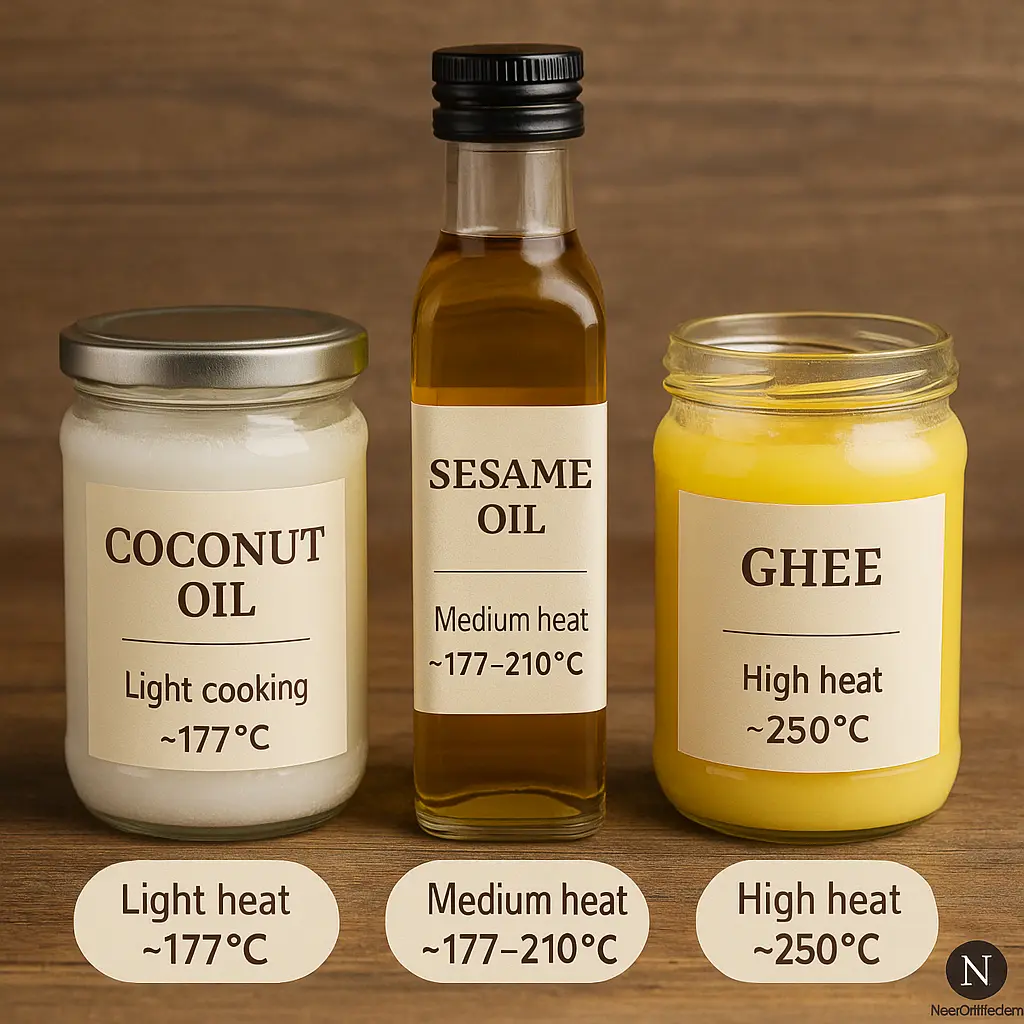

Smoke points (typical ranges): Coconut (virgin) ~177 °C; Sesame (cold-pressed) ~177 °C, (refined) ~205–210 °C; Ghee ~250 °C. Higher isn’t always “healthier”—but it does indicate tolerance to heat before visible smoke and rapid oxidation. Regardless of choice, avoid overheating and never reuse oil repeatedly.
- Coconut oil: Rich in MCTs (lauric, caprylic, capric). Pleasant aroma; medium heat; useful in baking and light sauté.
- Sesame oil: MUFA/PUFA blend with unique lignans (sesamin, sesamol) that act as antioxidants during cooking.
- Ghee: Clarified butter—very low moisture/protein, high oxidative stability, and naturally rich in fat-soluble vitamins A/D/E/K alongside butyrate.
Note: Actual values vary by refinement, freshness, and brand testing.
Evidence-Backed Health Benefits
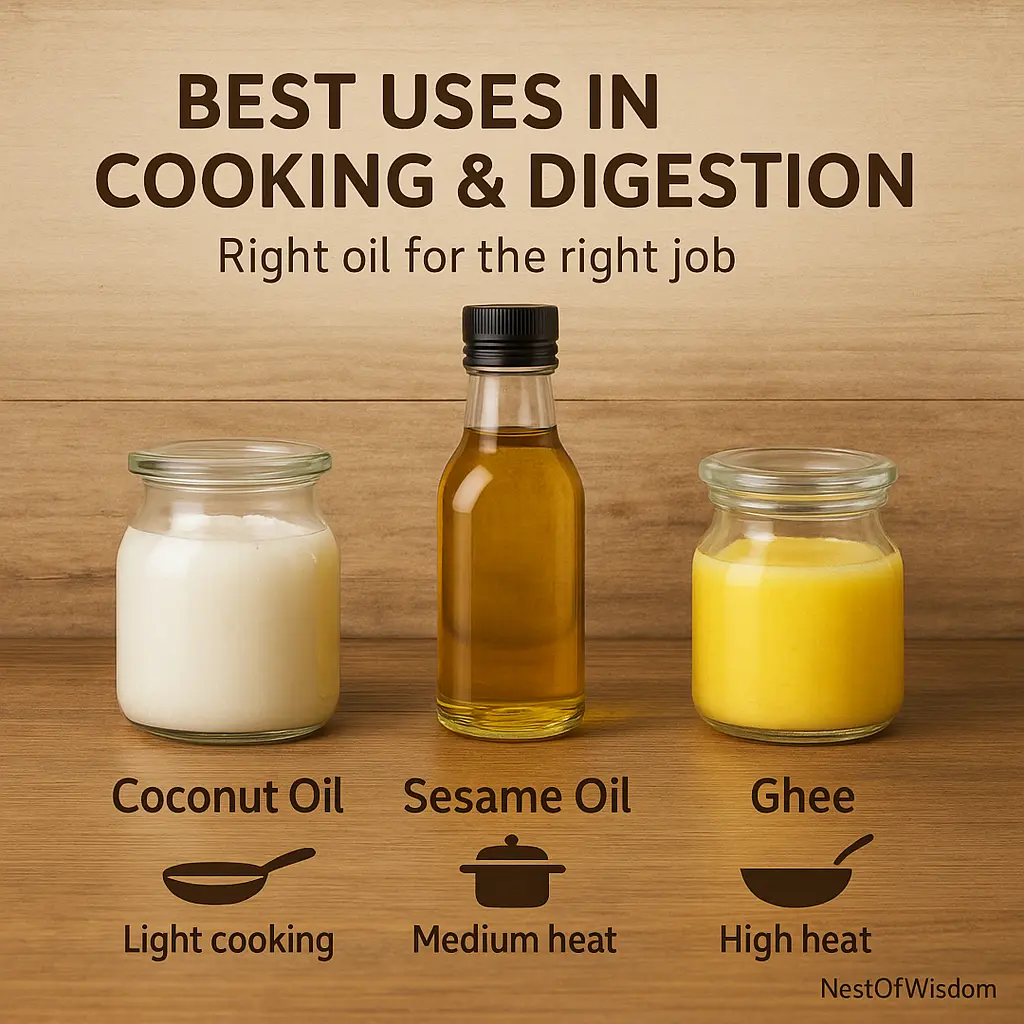

Coconut Oil (within Coconut Oil vs Sesame Oil vs Ghee)
MCTs & quick energy: Medium-chain triglycerides are metabolized differently than long-chain fats and can be converted to ketones—an alternate fuel in specific contexts. Research explores MCTs for cognition and metabolic support. Lauric acid exhibits antimicrobial activity that supports oral hygiene during oil pulling when used properly (NCBI/PubMed Central).
Practical takeaway: Use coconut oil for light sauté/tempering and in bakes where coconut aroma complements the recipe; consider oil pulling as an adjunct to brushing/flossing.
Sesame Oil (within Coconut Oil vs Sesame Oil vs Ghee)
Antioxidant & cardio-metabolic support: Lignans (sesamin, sesamol) and an unsaturated profile are linked with favorable lipid and blood pressure changes in controlled settings (study). Sesame’s antioxidants reduce oxidative stress at moderate heat, making it a reliable daily cooking fat.
Traditional edge: Warm abhyanga with sesame oil can ease joint stiffness in cooler months.
Ghee (within Coconut Oil vs Sesame Oil vs Ghee)
Digestion & absorption: Butyrate supports colon cell health and the gut barrier; ghee’s fat-soluble vitamins help absorb phytonutrients from spices and greens (WJG review). High heat tolerance makes ghee ideal for tadka without burning.
Best Uses in Cooking & Digestion
- Coconut: Chutney tempering, poriyal, light sauté, certain bakes. Avoid long, high-heat deep frying. Great for pre-wash hair masks and oil pulling.
- Sesame: Medium-heat gravies, vatha kuzhambu, stir-fries, pickles. Refined sesame handles slightly higher heat than cold-pressed.
- Ghee: High-heat tadka for dals, kichdi, finishing drizzle on rice. Enhances absorption of turmeric/cumin phytonutrients.
தமிழில்: “சமையலில் சரியான எண்ணெய்—சுவைக்கும் சுகாதாரத்திற்கும் துணை.”
Which Is Best for Specific Conditions?
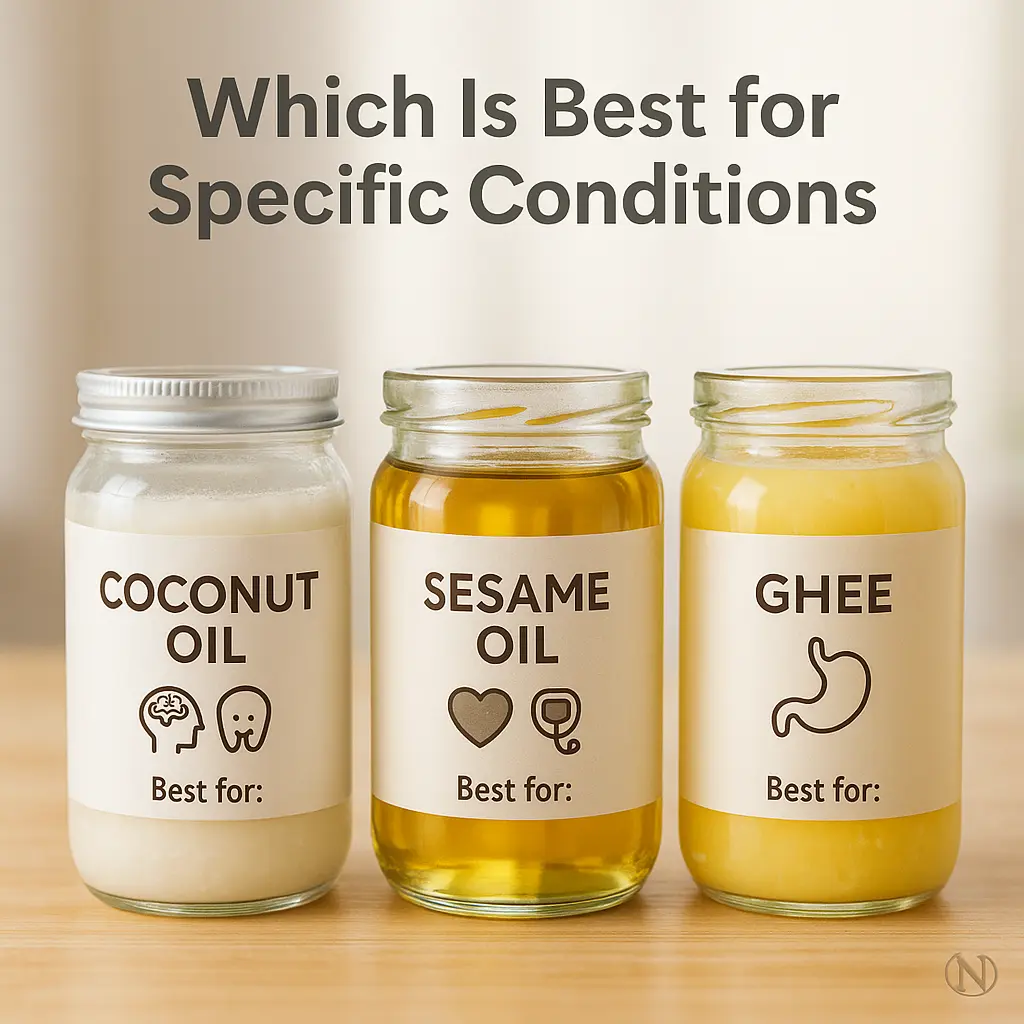

- Brain clarity & oral care: Coconut (MCTs; oil pulling).
- Heart-smart daily cooking: Sesame (unsaturated profile + antioxidants); emphasize total diet quality.
- Digestive ease & nutrient uptake: Ghee (butyrate; fat-soluble vitamins) with dal/greens.
- Joint comfort & warmth: Sesame oil abhyanga in cool weather.
- Kids & elders (satiety): A little ghee with rice/veg; monitor total calories.
How to Rotate: A Weekly Balanced Plan
Rotating Coconut Oil vs Sesame Oil vs Ghee broadens your nutrient spectrum and aligns with seasons.
- Mon–Wed (Light & bright): Coconut oil for breakfast poriyal and light sauté; evening oil pulling (1 tbsp, 10–15 min).
- Thu–Fri (Heart-smart): Sesame oil for gravies/stir-fries; warm sesame abhyanga once for joints.
- Sat–Sun (Comfort & feast): Ghee for tadka, kichdi, or festive sweets; optional warm milk with 1 tsp ghee at night if it suits you.
Clinician tip: If you have lipid concerns, personalize portions with your healthcare professional. Quality and freshness matter more than chasing a single “super-oil.”
Label Decoding & Quality Checks
To get the most from Coconut Oil vs Sesame Oil vs Ghee, scan labels like a pro:
- Coconut: Prefer cold-pressed/virgin for aroma and minimal processing. For baking/frying, refined coconut oil offers neutral flavor—but keep temperatures sensible.
- Sesame: “Cold-pressed,” “wood-pressed,” or “unrefined” signal aroma/antioxidants; “refined” handles slightly higher heat. Avoid blended oils if purity is your goal.
- Ghee: Look for grass-fed and traditional slow-cooked options. Pure ghee should be lactose/casein minimal; a clean, nutty aroma and granulated set are quality signs.
Batch notes: Buy smaller bottles if you cook less frequently; fresher oils taste better and oxidize less.
Allergy, Lactose & Dietary Considerations
Choosing among Coconut Oil vs Sesame Oil vs Ghee also involves personal tolerances:
- Sesame allergy: If allergic, avoid sesame oil (even refined) unless cleared by your allergist.
- Dairy sensitivity: Ghee has most milk solids removed and is typically well tolerated even in lactose intolerance, but dairy-allergic individuals should discuss with their clinician.
- Vegan/Vegetarian: Coconut and sesame are plant-based; ghee is animal-derived. Choose to match ethics and needs.
- Calories & weight goals: All fats are calorie-dense; portion size matters more than brand claims.
Storage, Shelf Life & Cost per Serving
Storage: Keep oils away from heat, light, and moisture. Use opaque containers or store in a dark cabinet. For coconut and sesame, seal tightly; for ghee, use a clean, dry spoon to avoid moisture.
- Shelf life (typical): Coconut oil: 12–24 months; Sesame (cold-pressed): 6–12 months; Ghee: 6–12 months at room temp (longer refrigerated).
- Cost per serving: A tablespoon (≈14 g) is a “serving” in most nutrition labels. Because flavor and performance differ, you’ll often use less ghee to achieve aroma, balancing cost.
Common Mistakes & Quick Fixes
- Overheating: If oil smokes, discard and start over. Lower flame; preheat pan first, then add oil.
- Reusing oil repeatedly: Avoid. Oxidation and off-flavors build quickly. Use fresh oil for best results.
- Using one oil for everything: Rotate. That’s the whole value of comparing Coconut Oil vs Sesame Oil vs Ghee.
- Ignoring freshness: Stale oil smells “painty” or bitter. Buy smaller bottles; check dates.
தமிழ் வழக்கம்: “எண்ணெய் நீருக்கு அருகே போகக் கூடாது—தூய்மை காத்தால் சுவை காக்கும்.”
Myths vs Facts: Coconut Oil vs Sesame Oil vs Ghee
- Myth: “One oil is the healthiest for everyone.”
Fact: Context decides. Rotate Coconut Oil vs Sesame Oil vs Ghee based on dish, heat, health goals, and preferences. - Myth: “Higher smoke point always means healthier.”
Fact: It means higher heat tolerance. Health depends on diet quality, portions, and avoiding oxidation. - Myth: “Ghee is bad because it’s saturated fat.”
Fact: Ghee’s butyrate and vitamins have digestive/culinary value. Balance portions; view fats in the context of the whole diet.
FAQs: Coconut Oil vs Sesame Oil vs Ghee
1) How do I start rotating Coconut Oil vs Sesame Oil vs Ghee without confusion?
Try a simple split: coconut for light sauté/tempering, sesame for daily gravies and stir-fries, and ghee for high-heat tadka or finishing. Track energy, digestion, and taste for two weeks and adjust.
2) Which is best for oil pulling—Coconut Oil vs Sesame Oil vs Ghee?
Coconut is commonly used for oil pulling due to taste and lauric acid; sesame is traditional in some lineages. Ghee isn’t typical for pulling—reserve it for cooking/bedtime rituals.
3) For heart-smart cooking, who wins in Coconut Oil vs Sesame Oil vs Ghee?
Sesame oil’s unsaturated profile and lignans are supportive for day-to-day cooking at moderate heat, alongside an overall diet rich in vegetables, legumes, and whole grains.
4) Which oil helps digestion most in Coconut Oil vs Sesame Oil vs Ghee?
Ghee often feels soothing thanks to butyrate and helps with nutrient absorption. Use modest portions and quality sources.
5) Can I use Coconut Oil vs Sesame Oil vs Ghee on the same day?
Yes—use the right fat for each dish. This is the most practical way to unlock benefits without overcomplicating your routine.
Conclusion
Coconut Oil vs Sesame Oil vs Ghee is a balance, not a battle. Coconut supports light cooking, freshness, and oral-care routines; sesame excels at medium-heat daily dishes with antioxidant support; and ghee owns high-heat tadka and digestive comfort. Rotate intentionally, buy high quality, avoid overheating, and listen to your body. தமிழில்: “அளவோடு பயன்படுத்தினால் நலம் நிலைத்திருக்கும்.”
References
- Harvard T.H. Chan School of Public Health – Nutrition Source (dietary fats overview; cooking oils guidance)
- Clinical study on sesame oil & blood pressure (context for cardio-metabolic effects)
- NCBI/PubMed Central (MCTs, lauric acid, and oral health/oil pulling discussions)
- Butyrate and gut health – World Journal of Gastroenterology (ghee/butyrate rationale)
- Smoke point ranges (overview template) (cross-check with brand specs)
Related on NestOfWisdom:
Nest of Wisdom Insights is a dedicated editorial team focused on sharing timeless wisdom, natural healing remedies, spiritual practices, and practical life strategies. Our mission is to empower readers with trustworthy, well-researched guidance rooted in both Tamil culture and modern science.
இயற்கை வாழ்வு மற்றும் ஆன்மிகம் சார்ந்த அறிவு அனைவருக்கும் பயனளிக்க வேண்டும் என்பதே எங்கள் நோக்கம்.
- Nest of Wisdom Authorhttps://nestofwisdom.com/author/varakulangmail-com/
- Nest of Wisdom Authorhttps://nestofwisdom.com/author/varakulangmail-com/
- Nest of Wisdom Authorhttps://nestofwisdom.com/author/varakulangmail-com/
- Nest of Wisdom Authorhttps://nestofwisdom.com/author/varakulangmail-com/
Related posts
Today's pick
Recent Posts
- Internal Linking Strategy for Blogs: A Practical, Human-Centered Playbook
- AI in the Automotive Industry: A Practical, Human-Centered Guide
- Cloud Tools for Small Businesses and Freelancers: The Complete Guide
- Generative AI in Business: Real-World Use Cases, Benefits & Risks
- 7 Life-Changing Daily Habits for Weight Loss Without Dieting

